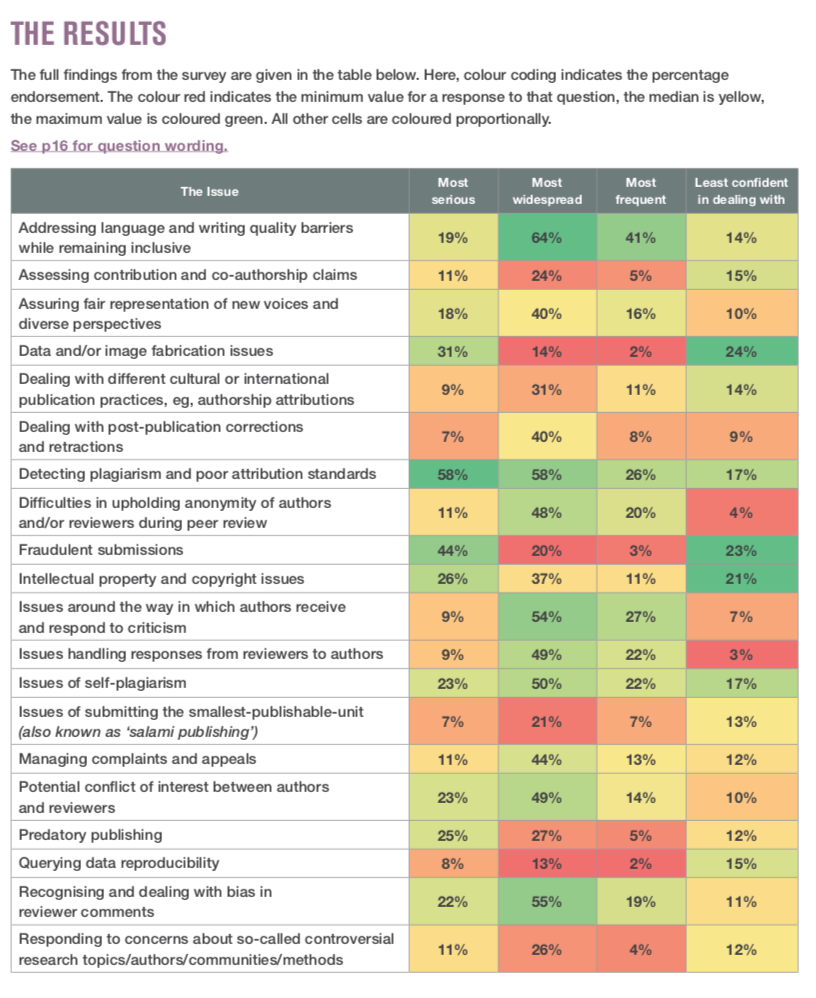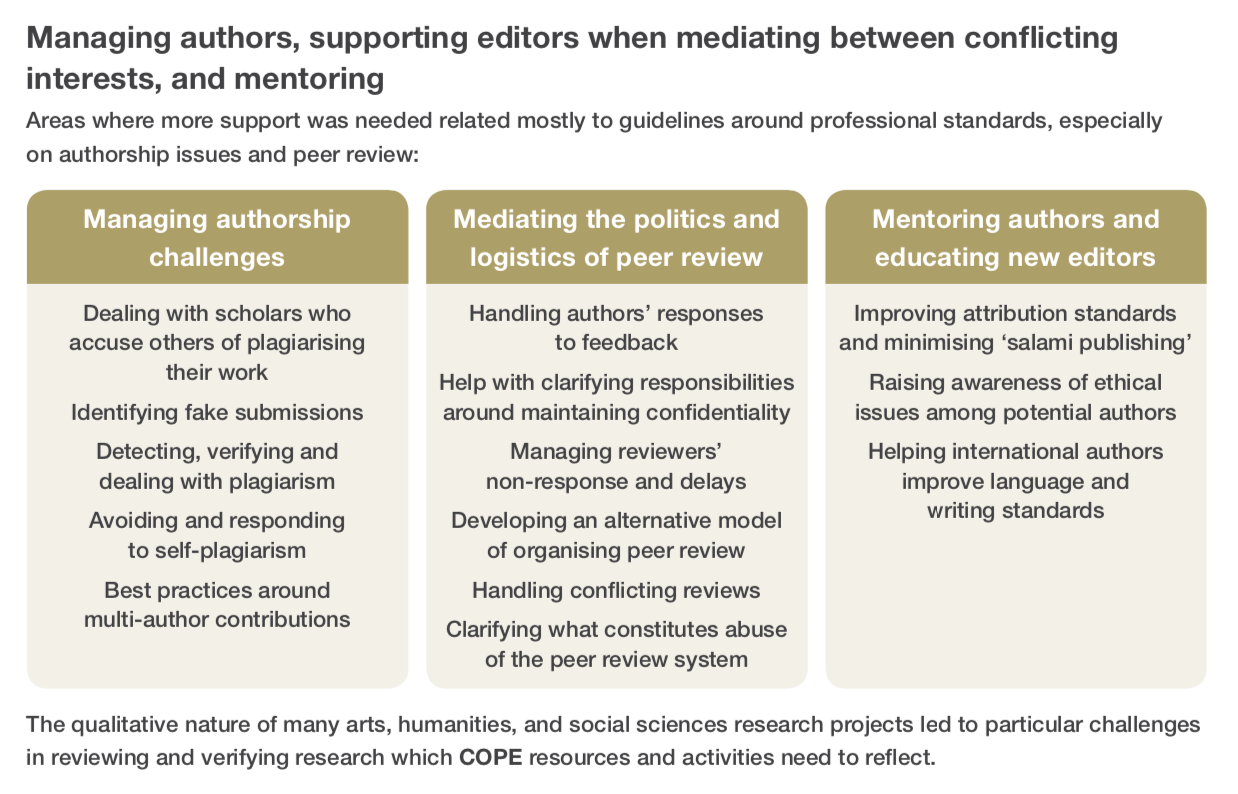You have /5 articles left.
Sign up for a free account or log in.

COPE
What keeps journal editors up at night? Inclusion issues, along with plagiarism and other kinds of fraud, according to a new report from the Committee on Publication Ethics.
The report's authors first held focus groups with journal editors to discover what concerned them most. Among the 20 identified issues were addressing language and writing quality barriers while remaining inclusive and assessing contribution and co-authorship claims. Assuring fair representation of new voices and diverse perspectives, data or image fabrication issues and smallest-unit-possible, or "salami," publishing also made the list.
Some 656 arts, humanities and social sciences editors were then surveyed about those issues, earlier this year. They ranked plagiarism and poor attribution standards, fraudulent submissions and data or image fabrication as the most serious.
The most widespread issues, according to editors, are language and writing concerns with respect to inclusivity, detecting plagiarism and recognizing and dealing with bias in reviewer comments.
Based on their own personal experience, editors said they most frequently encounter problems related to language and inclusivity, along with how authors receive and respond to criticism. They'd also frequently worked to detect plagiarism and poor attribution.
Asked which concerns they were least confident in in dealing with, editors said data or image fabrication, fraudulent submissions and intellectual property and copyright.

On inclusivity, for example, one editor in the arts said, "We have mainly been thinking about the ethical issue of who gets published … we are trying to support good scholars to get into the publication process. But, on the other hand, trying to keep the academic status of the journal."
Another editor, in the social sciences, said that there are increased numbers of authors "from non-English speaking backgrounds whose language issues seriously affect how we can work with their material. We presently have a good diversity of reviewers, but this must be kept up through active searching for appropriate reviewers."
A second social sciences editor said, with respect to authorship, "I don't always feel confident that the list of authors reflects reality."
Nearly 20 percent of editors, for example, had direct experience with fraudulent submissions, from hoax articles to articles written by someone other than the named author.
Many survey respondents also thought that technological changes and a metrics-based academic culture will likely exacerbate these key ethical issues going forward.
"Ties between reviewers and authors that make blind review impossible are also worries," one respondent said. "In particular, a reviewer can often easily uncover the author because working papers are published online prior to submission to a journal." (Indeed, a recent case in sociology demonstrates how this happens.)
Weighing "speed of publication given rEF (research Excellence Framework) requirements in the UK … is it ethical to ask an emeritus professor to wait to be published if a junior professor in the UK needs a publication now for rEF 2020?" for example, another editor in the arts and humanities asked.
Machine-authored manuscripts "are beginning to seem like a real possibility," said yet another editor in the humanities and social sciences.
The international publication committee, known as COPE, is dedicated to helping resolve academic publishing's thorniest ethics issues. It offers editors and fellow academics guidelines, flowcharts and other resources that address most of the concerns raised in the study -- even if academics aren't familiar with them. Some 28 percent of respondents said they were previously unfamiliar with COPE. Still, COPE says the survey makes clear that it needs to foreground its inclusion resources, including those on language.
Deborah Poff, chair of COPE, said in a statement that findings are consistent with members' comments at a North American seminar earlier this year.
"These findings provide important information about the specific resource needs of our editors and publishers in numerous arts, humanities, and social sciences fields," she added. "In the coming months, we will continue to roll out discussion material and resources specifically focused on issues in these fields."

Source: COPE
Tracy Roberts, publishing director for the arts, humanities and social sciences at Taylor & Francis, which is part of Routledge, said, "We understand the publication ethics challenges faced by journal editors in these fields and work alongside editors and editorial boards, providing support on individual cases in line with existing COPE guidance."
Earlier this year, following focus groups with publishers, the group surveyed academic editors of arts, humanities and social sciences journals, both COPE members and non-members. The sample size is about triple that from a similar, 2009 survey of editors of science journals.
"The landscape for journal editors in both scientific and arts, humanities, and social sciences publishing has changed over the past 10 years, not least through advances in publishing technology (including the development of plagiarism-detection tools …)" the report says, along with "the further development of open access, increasing globalization of academic activity and the increasing use of research assessment exercises," such as Britain's new research excellence metric.
The new report, then, aims to be "an up-to-date examination of perceptions of publication ethics issues by arts, humanities, and social sciences journal editors." By comparison, the science editors' survey from 10 years ago revealed little concern about inclusion. Some editors in the new study also commented on how inclusion in publishing was part of a much bigger conversation on equity and diversity. Ten years ago, in the sciences, editors also reported relatively frequent experience with plagiarism, as well as redundant publication.
Clarissa Hayward, professor of political science at Washington University in St. Louis, was recently named as part of the American Political Science Review's first-ever all-female editorial team. One of the new team's major focuses is inclusion, "not only whose voices are included" but also, relatedly, "the research questions scholars ask and the methods they use."
Michael V. Dougherty, Sr. Ruth Caspar Chair in Philosophy at Ohio Dominican University, has been called the “plagiarism police” for his interest in exposing plagiarism in the humanities. With the help of a few colleagues, he says he’s requested retractions for more than 100 plagiarized articles spanning a decade. Of the new study, he said that he was “delighted to see a growing awareness of the problem of plagiarism in humanities disciplines.”
In talking about his own side gig with other professors, he said, “they seem genuinely surprised to hear that plagiarism is such a threat to the integrity of the published research literature.” But plagiarists are typically serial plagiarists, he said, and just one “can seriously contaminate the downstream research in a specialized subfield.” And actually getting those articles retracted can take years.
Dougherty said that many editors and publishers in the humanities simply aren’t aware of “disguised” forms of plagiarism, including what are called translation, compression and template plagiarism. He’s currently writing a book on disguised plagiarism to help editors, publishers and researchers alike.
The biggest share of respondents to the new survey (37 percent) were based in the U.S. The vast majority (83 percent) were volunteer or honorarium editors, and had had editorial roles at journals for more than three years. Half of respondents were affiliated with journals published by Routledge, partner in the project. COPE says this limits the generalizability of its findings, but only to a degree.
Responses were relatively consistent across disciplines. There is some evidence, however, that business, finance and economics editors face more ethical issues than other arts, humanities, and social sciences disciplines. These editors were more likely to encounter or hear about plagiarism and attribution, self-plagiarism, managing complaints and appeals, fraudulent submissions and data or image fabrication issues.





